
Exposé Online
What's old
Exposé print issues (1993-2011)
- 1 (October 1993)
- 2 (February 1994)
- 3 (May 1994)
- 4 (August 1994)
- 5 (October 1994)
- 6 (March 1995)
- 7 (July 1995)
- 8 (November 1995)
- 9 (March 1996)
- 10 (August 1996)
- 11 (February 1997)
- 12 (May 1997)
- 13 (October 1997)
- 14 (February 1998)
- 15 (July 1998)
- 16 (January 1999)
- 17 (April 1999)
- 18 (November 1999)
- 19 (May 2000)
- 20 (October 2000)
- 21 (March 2001)
- 22 (July 2001)
- 23 (December 2001)
- 24 (April 2002)
- 25 (September 2002)
- 26 (February 2003)
- 27 (August 2003)
- 28 (December 2003)
- 29 (April 2004)
- 30 (September 2004)
- 31 (March 2005)
- 32 (September 2005)
- 33 (May 2006)
- 34 (March 2007)
- 35 (January 2008)
- 36 (October 2008)
- 37 (July 2009)
- 38 (July 2010)
- 39 (Summer 2011)
Features
In Cahoots with the Guitar Man —
The Phil Miller Interview 2002
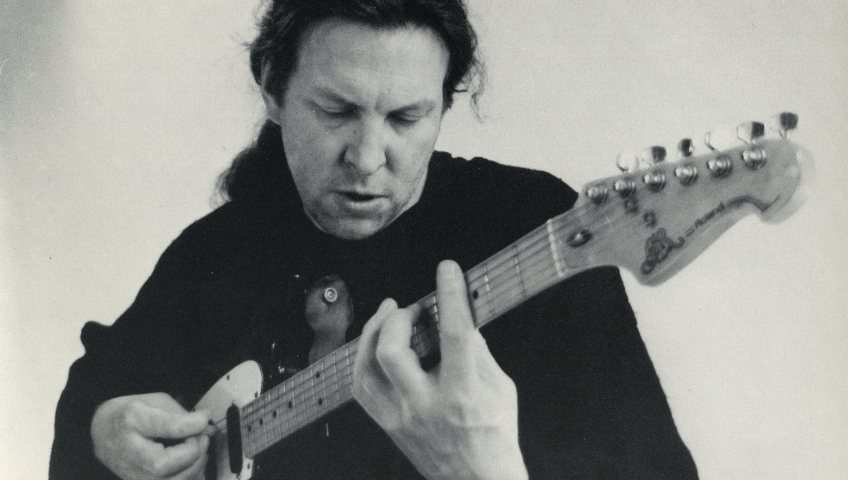
Exposé had the privilege of speaking to Canterbury veteran Phil Miller on the evening of August 17th at our vendor table inside Seattle's Moore Theater. Progman Cometh festival headliners Softworks (with Allan Holdsworth, Hugh Hopper) had nearly blown the top off the venue and Miller was in amicable mood to speak about his recent activities and specifically how he came to play in the Pacific Northwest for the first time in his long career.
by Jeff Melton, Published 2003-02-01
 This is your first trip not only to the West Coast, but also to the U.S. isn't it?
This is your first trip not only to the West Coast, but also to the U.S. isn't it?
Second really. In 1979, the first was the National Health tour of the East Coast, which resulted in the recent archival release Playtime on Cuneiform.
The first thing I'd like to talk about is the recent re-release of the Delivery album (Fools Meeting, on Cuneiform). You were pretty heavily involved in that with your brother, Steve?
It was more or less a project of Steve and mine to a certain extent. My brother was probably the leading force behind the band. Being brothers we kind of took an integral part in the music. Yes, I was fairly involved in that.
Most of the material on the album was vocal though?
That's right, you know it was first sort of attempts at writing songs or whatever. They were the first ones I really did I suppose.
Also added onto the Delivery disc was that little piece of music from the Tower of London gig (with Richard Sinclair on bass).
Well, it was from around that period. It was around the time when we played with Caravan. But it probably was not from that actual gig. That was brought forward from around that time.
That was really the beginning of Hatfield (and the North) wasn't it? When Dave (Sinclair) came along the sound changed, but it all started with you and Pip and Richard?
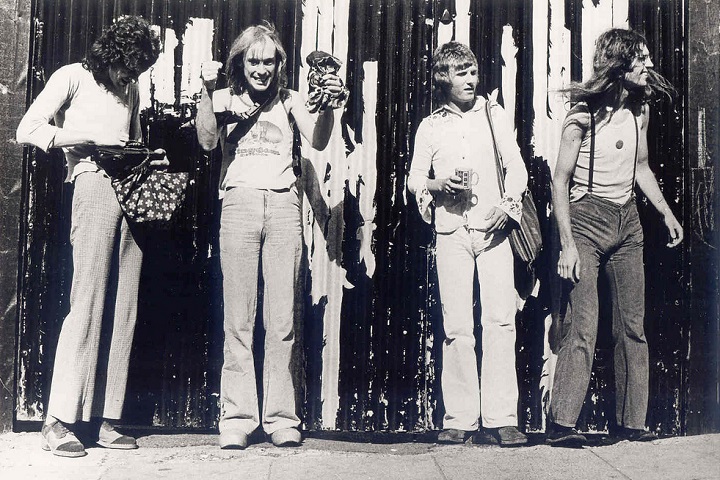 Yes that was the first instance of Hatfield, that's right.
Yes that was the first instance of Hatfield, that's right.
The real improvisational part of the band was the core of the group before Dave Stewart joined?
Well, we actually asked Alan (Gowen) to join before Dave. But we ended up preferring Dave because it just worked better actually at that time. That's no disrespect to Alan 'cause he's my mentor and a guiding light from out there (raises hand). I think it had something to do with his sounds as he had crap gear in those days. Sound counts for something, you know? Dave was a superb musician and very organized sound-wise. He had the gear and it wasn't just potential; it was there happening. Alan's potential was yet to come, as he really didn't have the equipment to show off his ideas and he had loads of ideas. At this point Alan realized that writing was what he was into — not really concentrating on getting his sound together. It was in his head and on the written page but not yet on the keyboard.
Regarding your brother (Steve) passing away, did your last album, (Out of the Blue) turn into a tribute album for him?
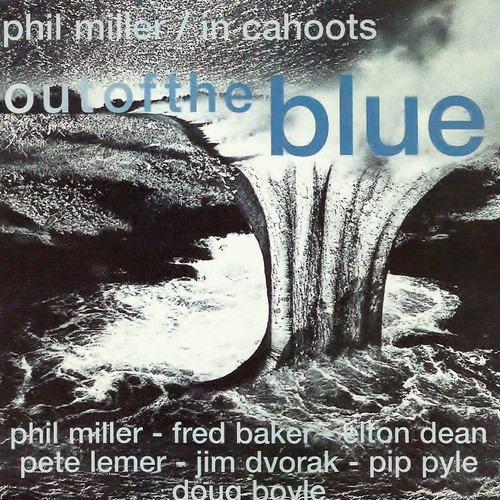 Well, yeah, a little bit. Having re-released the Delivery album on Cuneiform forced to me to think about it. I happened to be writing a lot of bluesy pieces so I thought there was a chance to set that all off and show what I could do with that type of thing now. I could show I could write just as intricate, just as harmonically vocal with a blue sort of tinge to it.
Well, yeah, a little bit. Having re-released the Delivery album on Cuneiform forced to me to think about it. I happened to be writing a lot of bluesy pieces so I thought there was a chance to set that all off and show what I could do with that type of thing now. I could show I could write just as intricate, just as harmonically vocal with a blue sort of tinge to it.
How did you come upon Doug Boyle to add the additional guitar for your latest album?
I met Doug at a Caravan concert. I liked his sound and his playing. He's a virtuoso guitarist and you know we got friendly. I had some things that were suitable for two guitars, and being friends by that time he was an obvious person to ask.
Everyone's curious: where did you get your new drummer, Mark Fletcher?
Well, I've heard Mark playing with Tim Garland [Now in Bruford's Earthworks. -ed.] and John Etheridge and liked what I heard obviously. Fred Baker played with Mark many years ago and they were a team together. We were looking for a new drummer, and Fred said let's ask Mark. He's an awesome player who has played with everybody and is extremely in demand and just a superb player. He's very easy to play with.
So your set (at the Progman Cometh festival) is going to cover your entire catalog?
 Yes, we will be playing a lot of earlier stuff and a few new things as well. The reason for that was because I was little bit unsure as to how long we could rehearse. I wanted to pick a few things that Mark would gravitate to and he would feel into. I knew these pieces would suit him and I thought, "Well, these pieces are the things we'll do." From the very earliest things we've done to three pieces on the last album.
Yes, we will be playing a lot of earlier stuff and a few new things as well. The reason for that was because I was little bit unsure as to how long we could rehearse. I wanted to pick a few things that Mark would gravitate to and he would feel into. I knew these pieces would suit him and I thought, "Well, these pieces are the things we'll do." From the very earliest things we've done to three pieces on the last album.
Your work has been the natural extension of National Health since that band called it a day. Someone has had to carry the banner for that style of music, but also going in a parallel jazz path. Was that a conscious effort for you to do that?
Well, I like all sorts of music and I write what I like to hear. You have to bear in mind who is going to play the stuff and what they're going to like too. You know everybody there are heavy jazz fiends. I like to think that I don't write obvious jazz stuff, but I hope it will be suitable for the players who are very heavy jazz musicians. I hope that my other side (my rock soul) will be in there somewhere poking its head through since I don't like to go fully that way, but I like to straddle the path somehow.
Can you tell me what it was like for you to first play with Elton DeanI?
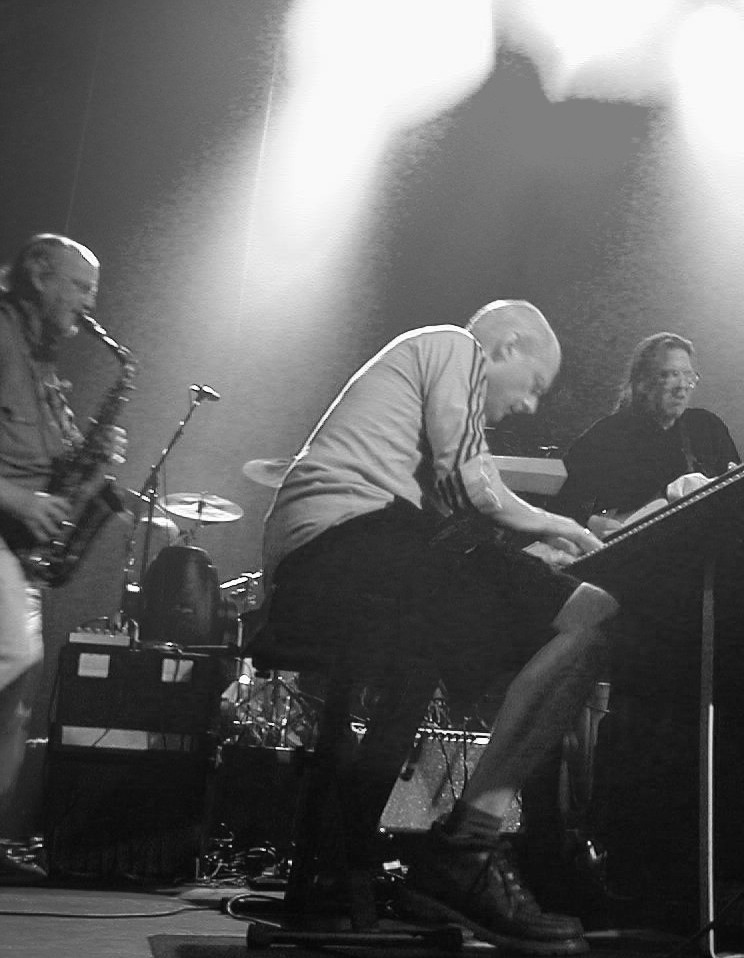 He's got such a beautiful voice on both alto and saxello. If you want a tune played with strength and conviction — it's an awesome sound. There's no one that I can think who can do the tunes with as much passion and love and intensity.
He's got such a beautiful voice on both alto and saxello. If you want a tune played with strength and conviction — it's an awesome sound. There's no one that I can think who can do the tunes with as much passion and love and intensity.
Obviously he found something in your work right after the D.S. Al Coda album. Was this a pretty easy connection to go from there into In Cahoots?
Well, yeah it was. Elton is freaking extremely good friends with Pip (Pyle) and Pip being in the band, you know. And I happen to live very near Elton, it s a nice walk. It's not a huge hassle to have them around to look at your tunes and do all the normal things one does before you put a tune forward. You'd like to hear more or less what it's going to sound like. Elton has been a good friend and musical companion of mine. And it's been a good time for me.
When did you decide to add Jim Dvorak into the band? Was that a really conscious effort to add a brass section to your sound?
I had been a fan of Jim's and I felt that some of things I was writing would need that extra voice. Jim has such a beautiful sound, and his sound and Elton's sound combine very well. They blend very well - that was my reasoning. I had the brass parts there and I wanted to write more brass type things. Plus add my voice to theirs and you have a feeling of a section that is extended as well. I do have ambitions to write for a really big orchestra — twenty pieces or so; with four trumpets and five saxes and all that — I'd like to do that sometime very much. Jim is just one more of those parts.
 In your overall compositional experience, would you say that Dave Stewart was pretty inspirational?
In your overall compositional experience, would you say that Dave Stewart was pretty inspirational?
Yes for me he was able to help me realize my tunes in those days [Hatfield, National Health]. He gave me good advice on how to put them together and sort of immersed himself in the tunes. Yes was very influential and an extremely able person who really puts body and soul in it — his whole being into it. Once he decides he's going to help you with a piece, it becomes as much his piece as it is mine and I like that.
Dave Stewart still follows your jazz work, doesn't he?
Well, I hope so. I don't see enough of Dave. He is obviously interested in what I'm up to out of curiosity and likewise. I like what Dave's been working on: his Gamelan orchestra pieces are very fine and I told him that. He should get them out, but he is such a perfectionist I don't suppose they will see the light of day for a while.
When you listen to other composers, do you see a lot of your rock style element in their work?
Mainly I love Mike Gibbs. Roy Babbington was with me in Delivery and he took me along to see Mike Gibbs when they were playing at Ronnie Scott's jazz club. He said, "Catch this, this is awesome stuff." And I was back there every night. Mike Gibbs is a hero of mine, one of my top-notch influences. And I hope it comes through.
What would you recommend of his material?
It's difficult really 'cos there is so much good stuff but really just about everything he does. I don't think there is a weak album with the big band music. I know there a few albums since then. I know that the one he did at Ronnie Scott's in the early seventies that is a double album with pieces by Carla Bley.
Did you know that Bedrock live show you did with Hatfield is on DVD now?
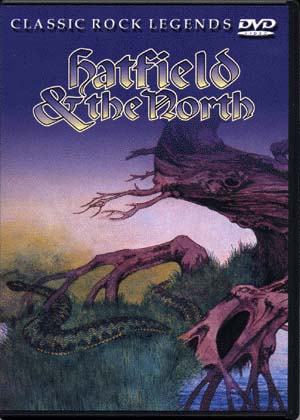 I didn't realize that. I wanted to do it since it was a nice opportunity and a good bit of exposure and wage. The offer was there and it was a nice thing to do at the time. Sophia (Domancich) is a stupendous musician, but a bit looser than Dave, less fastidious. Dave loves everything to be just so and he would have had to have a bunch of ten gigs before he was going to do that. He doesn't take any chances. Sure enough he likes everything to be up to his very very high standards. I have a slightly looser attitude to things. I like to get out there and play and make a bit of money and see what happens. One has to live by these things.
I didn't realize that. I wanted to do it since it was a nice opportunity and a good bit of exposure and wage. The offer was there and it was a nice thing to do at the time. Sophia (Domancich) is a stupendous musician, but a bit looser than Dave, less fastidious. Dave loves everything to be just so and he would have had to have a bunch of ten gigs before he was going to do that. He doesn't take any chances. Sure enough he likes everything to be up to his very very high standards. I have a slightly looser attitude to things. I like to get out there and play and make a bit of money and see what happens. One has to live by these things.
Can you tell me about Shortwave; what happened with that project?
In the end there were so many other things that were pressing. I think you can spread your energies too thinly and it's good to concentrate on a band a certain amount. I think Hugh and I felt that it was best to put our energies into our own projects. That's where there was much more of our own concern. But I very much loved playing with Didier [Malherbe, of Gong] who is one of my favorite musicians of all time. He is going to be on my next album and he's already on one track — he's superb on that. So, it was sad about that in the end just because it was just released and then Shortwave was finished. So that's it really, you have to give a lot of energy to bring music together. If you don't put that amount of energy in then it's not going to be quite good enough and fairly stretched. I found myself concentrating more on Short Wave when it was happening. You know I'm a bit of a tunnel vision man, once I get locked into something that's it. You can't give everything to one thing and then expect the other things just to naturally be there. I felt that with Hugh that it had come to its natural term at that point: Shortwave - short life.
You were supposed to tour over here to support your duet album Double Up with Fred Baker, right? I heard Michael Claire of University of Errors was trying to help set up a tour for you.
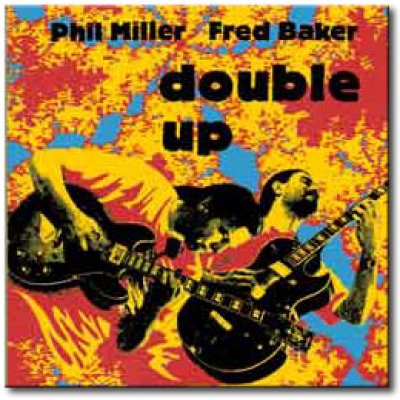 I would like to have done that and I'd still love to. We toured around quite a bit and yeah that was one of my all time favorite things to do. It's so easy to hear what you're doing and so mobile. In fact, my pieces represented on two guitars shows the harmonies at its clearest. Fred's such an amazing guitarist. I feel my compositions are probably best realized in that form while everything is crystal clear as to what's going on. But it's the most difficult gig to do as a guitarist because you're so exposed. I think that's the reason we haven't gotten another CD out. I don't think I can live up to my own expectations.
I would like to have done that and I'd still love to. We toured around quite a bit and yeah that was one of my all time favorite things to do. It's so easy to hear what you're doing and so mobile. In fact, my pieces represented on two guitars shows the harmonies at its clearest. Fred's such an amazing guitarist. I feel my compositions are probably best realized in that form while everything is crystal clear as to what's going on. But it's the most difficult gig to do as a guitarist because you're so exposed. I think that's the reason we haven't gotten another CD out. I don't think I can live up to my own expectations.
It's a wonderful album in particular since it contrasts with the rest of your catalog.
I really enjoyed it a lot and I'm determined to do another one eventually.
We have a standard question we usually ask everyone to wrap up our interviews: Have you ever played with Christian Vander of Magma?
No, but he's an awesome player, and I have seen a few of his jazz bands. I love his music, very hard stuff.
Special thanks to Jerry Cook for inviting Phil to the festival and helping to facilitate an in person conversation. Header photo and In Cahoots photo courtesy of Cuneiform Records.
Filed under: Interviews, Issue 26
Related artist(s): Didier Malherbe, Fred Thelonious Baker, Michael Gibbs, Phil Miller, Dave Stewart, Hatfield and the North, National Health, Pip Pyle, Richard Sinclair, Dave Sinclair, Short Wave, Delivery, Alan Gowen, Sophia Domancich
What's new
These are the most recent changes made to artists, releases, and articles.
- Release: Ciolkowska - Bomba Nastoyashchego
Updated 2026-02-26 13:08:55 - Review: Immensity Crumb - Chamber Music for Sleeping Giants
Published 2026-02-26 - Release: The Gatekeepers - Diary of a Teenage Prophet
Updated 2026-02-25 15:55:58 - Listen and discover: Mordecai Smyth will not break your back
Published 2026-02-25 - Review: Mars Lasar - Grand Canyon
Published 2026-02-25 - Release: Tashi Wada - What Is Not Strange?
Updated 2026-02-24 14:56:16 - Artist: Tashi Wada
Updated 2026-02-24 14:54:34 - Release: Greg Segal - Maintain!
Updated 2026-02-24 00:38:03 - Review: Il Segno del Comando - Sublimazione - Live
Published 2026-02-24 - Review: Nektar - Mission to Mars & Fortyfied
Published 2026-02-23 - Review: Jaime Rosas - Tres Piezas de Rock Progresivo
Published 2026-02-22 - Release: Kevin Kastning & Bruno Råberg - Across Tall Rain
Updated 2026-02-21 00:42:08 - Review: Gary Husband - Postcards from the Past
Published 2026-02-21 - Release: Daniel Crommie - Februa
Updated 2026-02-20 14:23:17 - Artist: Daniel Crommie
Updated 2026-02-20 14:22:43 - Release: b.mez - Under Circuitous Skies
Updated 2026-02-20 14:18:27 - Artist: b.mez
Updated 2026-02-20 14:17:34 - Release: Il Segno del Comando - Sublimazione - Live
Updated 2026-02-20 11:36:17 - Review: Maledictis - Echoes of Conscience
Published 2026-02-20
